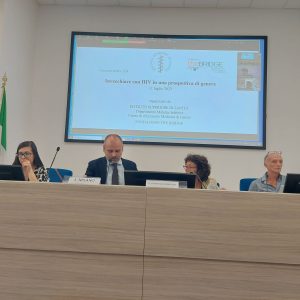HIV Outcomes Italy project, it is urgent to identify new diagnostic and therapeutic pathways
Rome, 11 July 2023 – Aging with HIV in a gender perspective, promoting targeted actions and starting new diagnostic and therapeutic pathways. This was discussed in Rome, during a conference co-organized by theHigher Institute of Health – Reference Center for Gender Medicine and Department of Infectious diseases e The Bridge Foundationwithin the project HIV Outcomes Italiaduring which experts met in a multi-stakeholder logic, for understand the relevance of gender variables in the context of aging in HIV.
“It is essential to highlight the dimensions and variables relating to gender to be considered as relevant also in the context of the aging process with HIV – has explained Mario Casciodell’European AIDS Treatment Group (EATG) – and therefore to be taken into consideration in the definition of diagnostic-therapeutic pathways. More services are needed to accompany and support patients aging with HIV”.
Cascio, together with the teacher Antonella D’Arminio Monforteof the University of Milan, are the scientific directors of the Italian section of HIV Outcomesa path born at European level in 2016 to think about a new way of addressing the needs of HIV-positive people and improving their lives, while at the same time increasing the sustainability of European health systems through the sharing of best practices and innovative approaches to care.
“We need a healthcare system that puts the patient at its center and that includes a change in the clinical approach to infection and related pathologies” observed Antonella D’Arminio Monforte, adding that “the theme of aging with HIV is taking on important implications in our society. The meeting at the ISS offered useful stimuli for reflection to enhance the specificity of gender and seek solutions to problems connected to everyone’s needs. Unlike what happens in other European countries, in Italy gender medicine has not assumed a central role in the definition of diagnostic and care pathways”.
For Anna Teresa Palamara, Director of the Department Infectious diseases of the Higher Institute of Health:
“If we are here today it is because research has achieved great results in the field of survival, care and well-being of people with HIV. This indicates to us that research is capable of achieving excellent results. Nothing should and should not be made absolute, research can bring progress but it is also capable of correcting itself when one works well, because it is possible that mistakes are made and that they are also corrected thanks to the continuous increase in knowledge”.
Second Barbara SuligoiAids Operations Center, Infectious Diseases Department, National Institute of Health:
“Over the years, the share of people over 50 with new HIV diagnoses has grown in percentage terms, a trend that is progressively increasing. The vast majority of transmissions occur through heterosexual contact. It is interesting that many people took the test because they had another pathology, while only a small percentage did so because they were aware that they had engaged in risky behavior and we need to reflect on this. We must try to increase the number of tests, favoring a method without the need for written informed consent, to make it easier”.
Luca BusaniReference Center for Gender Medicine, Istituto Superiore di Sanità, said:
“On the subject of aging it can be observed that for every child there are 5.4 elderly people. The old age index in 70 years has increased from 33.5% to 187.6%, while compared to 2011 the average age has risen by three years, from 43 to 46 years”.
Per Angela RuoccoReference Center for Gender Medicine, National Institute of Health:
“Land transgender older people (TGDs), have unique needs and pose particular challenges. Among the actions to be implemented, there is certainly targeted information. Furthermore, an inclusive approach to health care and new relationships of trust between operators and elderly people are needed, which can be expressed beyond the gender of belonging “.
Luisa BrogonzoliThe Bridge Foundation Study Center underlined that:
“From today’s discussion, the need for these fundamental issues to guarantee the well-being and quality of life of people with HIV to become an integral part of the regional diagnostic, therapeutic and assistance plans (PDTA) clearly emerges”.
In addition, there were Teresa BiniInfectious Diseases, San Paolo Hospital, Milan; Antonella Cingolaniinfectious diseases, Gemelli Polyclinic, Rome; Miki FormisanoHIV Positive People Network – NPS Italy; Daniel GianfrilliEndocrinology, “La Sapienza” University, Rome; John GuaraldiInfectious Diseases, University of Modena and Reggio Emilia.
NurseTimes editorial team
Follow us on:
